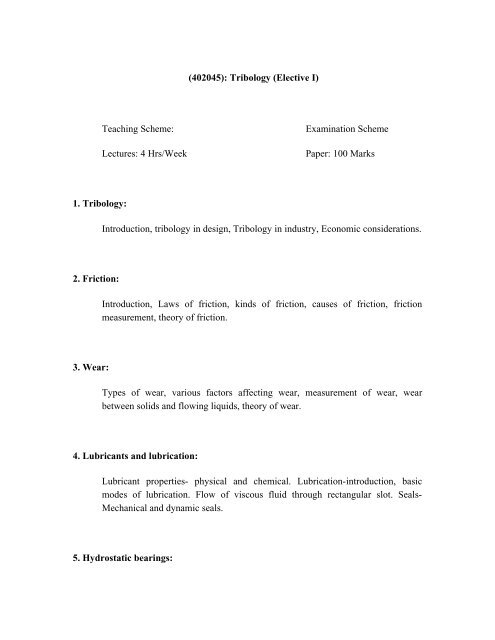BE Mechanical 2003 Structure - K. K. Wagh Education Society
BE Mechanical 2003 Structure - K. K. Wagh Education Society BE Mechanical 2003 Structure - K. K. Wagh Education Society
Chemistry of biogas generation variables affecting simple gas plants, types of digesteors thcir working and construction, application of biogas, use of bio-gas, case study of “pura village bio gas electricity generation”. Reference Books 1. Krietn and Krieder, principles of solar engineering, Tata McGraw HilI Publishing Company Limited, New Delhi, .1994; 2. Sukhatme S.P., Solar Energy, Tata McGraw Hill Publishing Company Limited, New Delhi, 1994. 3. Rai G.D., An Introduction to Power Plant Technology, Khanna Publishers, Third Edition, Delhi, 1996. 4. Wakil M.M., Power Plant Technology, McGraw Hill International Book Company, 1984. 5. Rai B.K., and Ramprasad M.S., Power generation through renewable sources of energy. 6. Bansal and others, Non-conventional Energy sources. 7. Garg H.P., and Prakash J., Solar Fundamental and Application, Tata McGraw Hill Publishing Company Limited, New Delhi, 1991. 8. S.Rao and Dr.B.B. Parulekar, Energy Technology, Khanna Publishers, New Delhi.
(402045): Tribology (Elective I) Teaching Scheme: Lectures: 4 Hrs/Week Examination Scheme Paper: 100 Marks 1. Tribology: Introduction, tribology in design, Tribology in industry, Economic considerations. 2. Friction: Introduction, Laws of friction, kinds of friction, causes of friction, friction measurement, theory of friction. 3. Wear: Types of wear, various factors affecting wear, measurement of wear, wear between solids and flowing liquids, theory of wear. 4. Lubricants and lubrication: Lubricant properties- physical and chemical. Lubrication-introduction, basic modes of lubrication. Flow of viscous fluid through rectangular slot. Seals- Mechanical and dynamic seals. 5. Hydrostatic bearings:
- Page 1 and 2: B.E. Mechanical 2003 Structure (w.e
- Page 3 and 4: and hypoid gears and comparison wit
- Page 5 and 6: 6. Design for manufacture: General
- Page 7: As far as possible, preference shou
- Page 10 and 11: Types of reaction turbines Francis,
- Page 12 and 13: 11. Design of a complete pumping sy
- Page 14 and 15: various applications, types of seal
- Page 16 and 17: ) Nuclear power plants: Advantages
- Page 18 and 19: (d) Heat rate incremental heat rate
- Page 20 and 21: (411044): Industrial Management-II
- Page 22 and 23: 11. J. L. Riggs, production Systems
- Page 24 and 25: absorption system, double effect sy
- Page 26 and 27: (402045): Non-Conventional Energy S
- Page 30 and 31: Basic concept, operations, advantag
- Page 32 and 33: (402045): Microprocessor Applicatio
- Page 34 and 35: (402045): Plant Engineering (Electi
- Page 36 and 37: 2. R.C. Rosaler-Handbook of Plant E
- Page 38 and 39: Type, number and dimensional synthe
- Page 40 and 41: 5.Blank sheets: No blank sheets be
- Page 42 and 43: This is to certify that the seminar
- Page 44 and 45: (402047): Project Teaching Scheme P
- Page 46 and 47: (402048): CAD/CAM and Automation Te
- Page 48 and 49: Concepts of automation, types of au
- Page 50 and 51: (402049): Dynamics of Machinery Tea
- Page 52 and 53: 2. Verification of principle of gyr
- Page 54 and 55: (402050) : Industrial Fluid Power T
- Page 56 and 57: 10. Actuators: (i) Linear and Rotar
- Page 58 and 59: Assignment One design report of a h
- Page 60 and 61: 4. Lubrication System: Types of fri
- Page 62 and 63: 2. Mathur M.L., and Sharma R. P., "
- Page 64 and 65: 8. Energy conservation in compresse
- Page 66 and 67: Design loads- hooks-wire ropes and
- Page 68 and 69: (402051): Costing and Cost Control
- Page 70 and 71: 2. Ashton Detal : Issues in Managem
- Page 72 and 73: spindles, bearings, preloaded suppo
- Page 74 and 75: (402051): Robotics (Elective II) Te
- Page 76: 10. Robot applications in manufactu
(402045): Tribology (Elective I)<br />
Teaching Scheme:<br />
Lectures: 4 Hrs/Week<br />
Examination Scheme<br />
Paper: 100 Marks<br />
1. Tribology:<br />
Introduction, tribology in design, Tribology in industry, Economic considerations.<br />
2. Friction:<br />
Introduction, Laws of friction, kinds of friction, causes of friction, friction<br />
measurement, theory of friction.<br />
3. Wear:<br />
Types of wear, various factors affecting wear, measurement of wear, wear<br />
between solids and flowing liquids, theory of wear.<br />
4. Lubricants and lubrication:<br />
Lubricant properties- physical and chemical. Lubrication-introduction, basic<br />
modes of lubrication. Flow of viscous fluid through rectangular slot. Seals-<br />
<strong>Mechanical</strong> and dynamic seals.<br />
5. Hydrostatic bearings:



